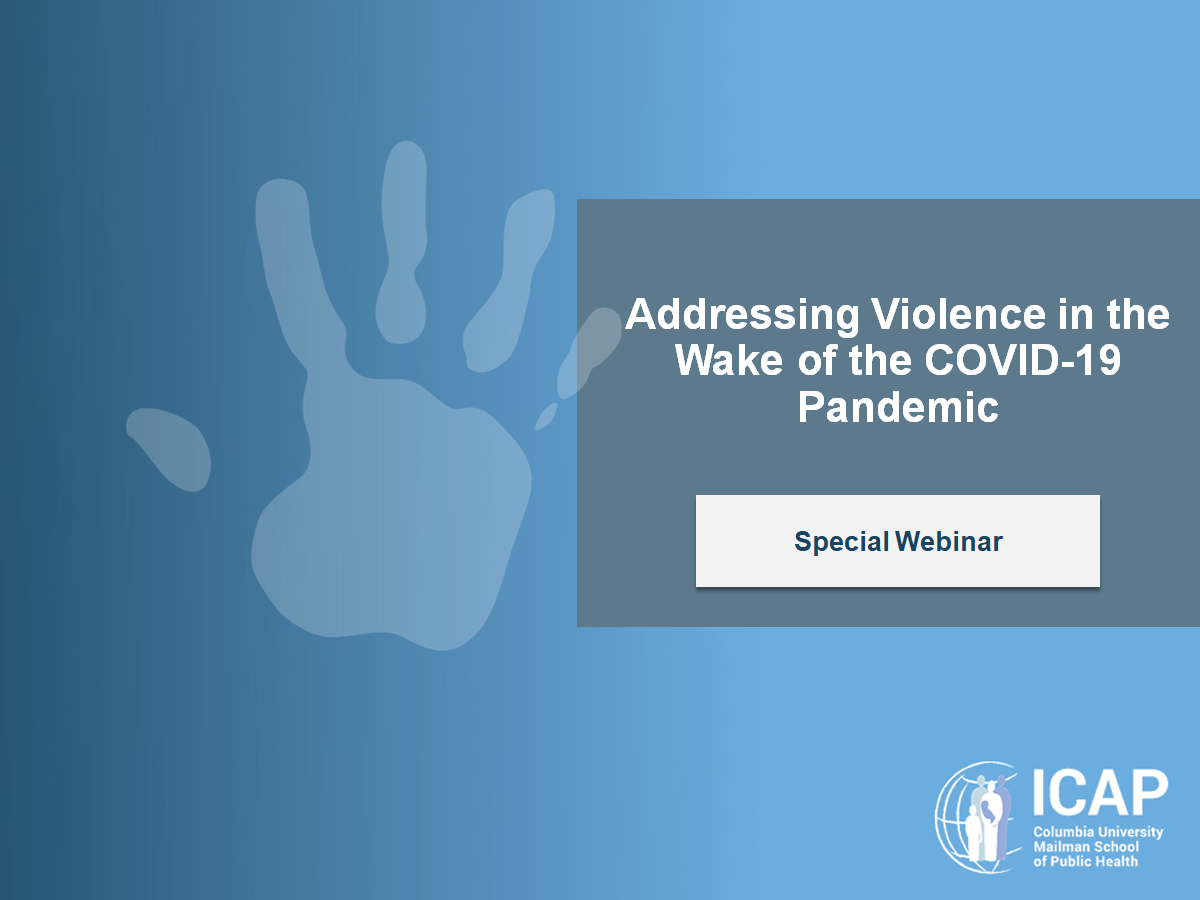On October 27, ICAP hosted a special webinar to reflect upon the impact of the COVID-19 pandemic in addressing gender-based violence (GBV) and violence against children and youth globally. The session included an overview of how various global health organizations have adapted their existing programs on ending violence to the current context of mandated lockdowns, limited access to services, and increasingly burdened health and social systems.
ICAP’s Andrea Low, MD, PhD, HIV clinical and scientific director of the Population-based HIV Impact Assessment (PHIA) project, started by sharing the history of ICAP’s work on violence prevention across multiple countries. This included implementing programs for sexual and GBV care and referral; bio-behavioral surveys measuring violence among female sex workers, men who have sex with men, transgender people, and migrant workers; and population-based surveys measuring physical and sexual violence among women.
As Principal Investigator of the 2018 Lesotho Violence against Children and Youth Survey (VACS), Low also shared key findings from the newly released report, which was further discussed in the panel session. “In Lesotho, sexual violence was relatively common among girls – at 15% – and physical violence was 1 in 3 among girls and almost 60% among boys, ” said Low “This report identifies some key gaps in access to care services and provides some important data to inform policies that need to improve these outcomes. ”
Low shared how ICAP will be building on this work by collecting information on violence in the community, verbal and physical abuse, and intimate and general violence in ongoing COVID-19 surveillance projects in Mozambique and New York City.
Next, Nafissatou J. Diop, PhD, chief of gender and human rights branch, the United Nations Population Fund (UNFPA) provided a global overview of UNFPA’s multilateral work on integrating GBV responses into health and emergency operations, including for COVID-19. During this time, UNFPA has focused on supporting services to continue care and collecting data on violence against women and girls when ethical and safety standards can be met.
“In terms of the response, all 150 countries where UNFPA has a presence have started to look more carefully into programming on GBV and it could respond to the COVID-19 context, said Diop. “This includes increasing efforts by strengthening systems, adapting to the current capacity of staff, government, and partners, continuing advocacy to ensure GBV is a priority, and delivering services in line with global guidance around COVID-19.”
To share a more granular example of how a city can respond to domestic violence and intimate partner violence during COVID-19, Catherine Stayton, DrPH, Director of the New York City Department of Health and Mental Hygiene’s Injury and Violence Prevention Program, shared how New York City has continued its focus on collecting meaningful data and working with local organizations and crisis hotlines to ensure individuals could receive care during New York City’s strict lockdown period.
“We have identified domestic violence as a concern that needs to be formally institutionalized in every emergency response forward looking,” said Stayton. ‘We are accentuating and promulgating messages about the root causes of IPV and DV and it is the structural forces of oppression that must be addressed for change to occur and sustained healing to happen.”
Another key focus area of the webinar was looking into the implications of violence against children and youth during the pandemic.
During the panel session, Greta Massetti, PhD, senior scientist, division of violence prevention, U.S. Centers for Disease Control and Prevention (CDC) and ‘Mantoa Sejake, acting director of child protection services, Lesotho Ministry of Social Development stressed the importance of using existing violence data to respond to the needs of women, children, and young people.
“What we know is that those who are already vulnerable are likely to have become more vulnerable at this time,” said Massetti, “One piece of that is understanding the VACS data helps us identify which young people, women and girls are most likely to be experiencing violence and need safe access to services. In the absence of the latest data on GBV and COVID-19, the best we can do is use what we already do have through VACS and other surveys.”
As the global pandemic continues to impact the lives of millions, this webinar served as an importance reminder for the international community, governments, national health and social service facilities, and community-based organizations to pay close attention and appropriately respond to the devastating violence still affecting individuals across the globe.
A global health leader since 2003, ICAP was founded at Columbia University with one overarching goal: to improve the health of families and communities. Together with its partners—ministries of health, large multilaterals, health care providers, and patients—ICAP strives for a world where health is available to all. To date, ICAP has addressed major public health challenges and the needs of local health systems through 6,000 sites across more than 30 countries. For more information about ICAP, visit: icap.columbia.edu.








